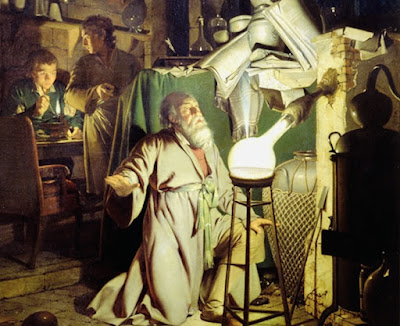“Over the years I have often reflected on the character of Mr. Sherlock Holmes. The one thing that excited him was the solution of a problem. It mattered nothing to him if the mystery was fresh and poignant or was thousands of years old. The mystery was all.” —Sherlock Holmes and the Rosetta Stone by Linda Stratmann
Mysteries are all about us. Consider the Higgs Boson.** It is one of the tiniest things in existence. It is so mysterious that, until recently, it only existed theoretically. It gives shape and size to everything that exists. It may actually be the fundamental “stuff” of creation. And for that reason, some call it “the God particle.”
The Higgs Boson belongs in the world of such brilliant scientists as Albert Einstein, Richard Feynman, Max Planck, Brian Greene, and, well, Peter Higgs (who predicted its existence). It crops up in discussions about the Theory of Relativity, Quantum Mechanics, and String Theory, among others. It’s from the branch of science seeking to assemble the still elusive theory of everything. It is the very definition of esoteric.
For some, the mysteries surrounding the Higgs Boson are irresistible.
Most of us, though, have trouble wrapping our heads around that kind of stuff. For most of us, it is going to remain a mystery. And that’s OK. That’s not to say no one should explore the God particle and all it might mean for connecting all those other mysteries. It’s just not going to be most of us.
So, what could we explore? We could fill our thoughts with musings about such mysteries as when (and how) the spark of life appears, what happens after we die, whether there is life elsewhere in the universe, or why cruise control won’t work in most school zones. You fill in that blank. There is really no end to the possibilities. That’s because we decide which mysteries enchant us.
It is important to note, though: There is a question of priorities. And that is the issue raised in this week’s scripture selection from Corinthians 13. Most people call this “The Love Chapter,” and rightly so. While there are many instructions about love in the scriptures (for example: Romans 13:8-10), the Corinthian chapter is the longest and fullest exploration all in one place.
Paul’s letter to the Corinthians is quite clear on love. The chapter breaks down like this: The first three verses are about the primacy of love, the next four about the character of love, and the final verses expand on love’s primacy.
And that brings us back to mysteries.
You might think that chapter is saying the exploration of mysteries is wrong. Not so. All Paul is saying is that, absent love, seeking knowledge and exploring mysteries is meaningless. Love must be primary. How we love, whom we love, and when we love: These are higher and more important.
Is it wrong to pursue our mysteries? No. In fact, there are many that are worthy of our time and attention. But, unlike with Sherlock Holmes, the mystery cannot be “all.” It helps to think of life as a journey, one in which setting the wrong priorities will result in the wrong destination. Read through Corinthians 13 to better understand how to undertake that journey.
After we learn to love, there will be plenty of opportunity to explore whatever mysteries enchant us.
_________________________
PHOTO (the Large Hadron Collider … and Homer Simpson discovers the Higgs Boson, first! Watch the brief report on YouTube):
**A simple explanation of Higgs Boson:
**A great animation illustrating Higgs Boson:
_________________________
Join us, Friday morning, for DaySpring’s Lectionary Breakfast. We meet at 8:00 at Our Breakfast Place and on Zoom**. We eat, we discuss scripture, and we laugh. What more could you want?
Blessings,
Steve
**Contact me for the Zoom link
NOTE: Zoom allows you to mute the camera & microphone if you don’t wish to be seen or heard.
SCRIPTURES FOR SUNDAY & THE COMING WEEK
Read them here:
Print them here:
Jeremiah 1:4-10
Psalm 71:1-6
1 Corinthians 13:1-13
Luke 4:21-30
___________________________



